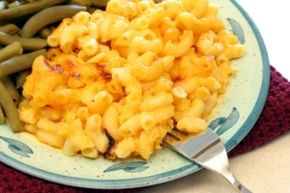A friend and I are dining at a neighborhood restaurant on a hearty meal of fettuccini Alfredo, mozzarella and tomato salad and bread dipped in olive oil. High in carbohydrates and fat, so-called comfort foods are an effective stress remedy.
"I eat fattening foods when I'm bored or depressed because it's something to divert me from my bad moods and it tastes good," my friend says. But "afterwards, it makes me feel worse because I know I shouldn't have eaten it."
Advertisement
When the going gets tough, people gravitate to the feel-good foods that we remember fondly from our youth — everything from macaroni and cheese to baked beans, ice-cream and candy bars. After the 9/11 terrorist attacks, an AC Nielson survey of grocery store sales reported a brief 12 percent surge in snack foods sales.
Do indulging in these simple pleasures come at the price of your waistline, health and a guilty after-taste? The verdict is decidedly mixed. The upside for my friend, who stays physically fit and keeps her cravings under control, is that she need not have eaters' remorse. "Even if you eat the most decadent dessert, if you control the portions, you can feel good about it and about yourself and move on," says Connie Diekman, a registered dietician and spokesperson for the American Dietetic Association (ADA).
Easier said than done. "The mind set in this country is that bigger is better," pronounces Margo Wootan, director of nutrition policy at the Center for Science in the Public Interest. Case in point: super-sized servings of fries, sodas, muffins and pasta are standard fare at many fast food and sit-down restaurants. "No one food is to blame but almost all foods are getting bigger in serving sizes," Wootan says.
According to David Katz, M.D. at the Yale University School of Medicine, overindulging in fatty, salty and sweet foods contributes to weight gain, and obesity itself can be a death sentence from diabetes, heart disease and cancer.
"People say they occasionally have a hot dog, hamburger and french fries, but when asked 'what else do you eat,' they say 'nothing,' meaning they're excluding whole grains, fresh fruits and vegetables," says Katz. "A poor diet and low levels of physical activity either have, or soon will, overtake tobacco as the leading underlying cause of premature, preventable death in the United States, resulting in almost 400,000 deaths per year."
Advertisement

